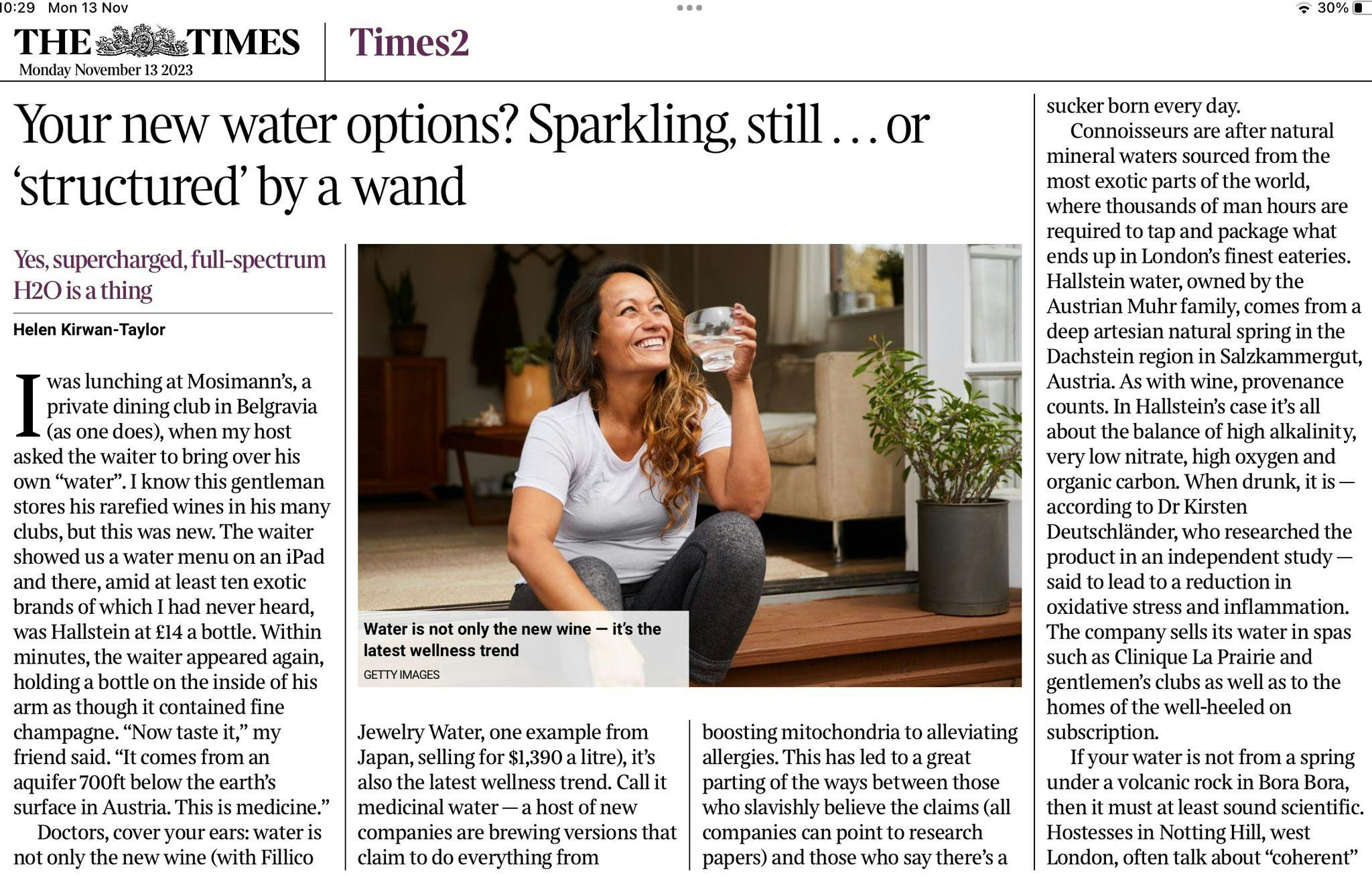Your new water options? Sparkling, still . . . or ‘structured’ by a wand
Originally posted in the "The Times". Published on Monday 13th of November, 2023.

I was lunching at Mosimann’s, a private dining club in Belgravia (as one does), when my host asked the waiter to bring over his own “water”. I know this gentleman stores his rarefied wines in his many clubs, but this was new. The waiter showed us a water menu on an iPad and there, amid at least ten exotic brands of which I had never heard, was Hallstein at £14 a bottle. Within minutes, the waiter appeared again, holding a bottle on the inside of his arm as though it contained fine champagne. “Now taste it,” my friend said. “It comes from an aquifer 700ft below the earth’s surface in Austria. This is medicine.”
Doctors, cover your ears: water is not only the new wine (with Fillico Jewelry Water, one example from Japan, selling for $1,390 a litre), it’s also the latest wellness trend. Call it medicinal water — a host of new companies are brewing versions that claim to do everything from boosting mitochondria to alleviating allergies. This has led to a great parting of the ways between those who slavishly believe the claims (all companies can point to research papers) and those who say there’s a sucker born every day.
Connoisseurs are after natural mineral waters sourced from the most exotic parts of the world, where thousands of man hours are required to tap and package what ends up in London’s finest eateries. Hallstein water, owned by the Austrian Muhr family, comes from a deep artesian natural spring in the Dachstein region in Salzkammergut, Austria. As with wine, provenance counts. In Hallstein’s case it’s all about the balance of high alkalinity, very low nitrate, high oxygen and organic carbon. When drunk, it is — according to Dr Kirsten Deutschländer, who researched the product in an independent study — said to lead to a reduction in oxidative stress and inflammation. The company sells its water in spas such as Clinique La Prairie and gentlemen’s clubs as well as to the homes of the well-heeled on subscription.
If your water is not from a spring under a volcanic rock in Bora Bora, then it must at least sound scientific. Hostesses in Notting Hill, west London, often talk about “coherent” or EZ water as they stick their Analemma quartz-glass wands into their unsuspecting guests’ glasses and stir. The marketing for this device says that “H2O molecules in drinking water move chaotically and crash into each other all the time”. A few stirs with Analemma’s £133 quartz vial filled with “mother water” and the stuff from your tap “radically changes the state of water into its supercharged, full-spectrum, coherent state by rearranging the H2O molecules into a liquid crystalline structure”. Structured water should improve energy, sleep, memory and even help weight loss (so the claims go). I admit to having a “wand” myself and being the subject of constant family ridicule (it does make water taste better …)
The queen of structured water, Carrie Bennett, whose wellness Instagram account is followed by every top biohacker in the world (and really took off post-Covid), is a big believer in the Analemma wand. “People have finally come to the understanding that water matters,” she says. “When you drink water from the tap full of fluoride and chlorine, your body does the work.” Using the wand, she claims, boosts energy and will “noticeably reduce anxiety after just three months of use”. If you think it’s niche, don’t. You can find a £159 structured water pitcher on the website Poosh, brought to you by Kourtney Kardashian.
The Analemma wand isn’t the only gizmo. Gen Z-ers never leave home without a water bottle in their hand. Upon closer inspection, you often see a glass and metallic bottle with a tiny plug-in socket. Hydrogen water (which is regular water with hydrogen gas added) has been a thing for a while, but since it came to the attention of biohackers, no fashionable household has been without it. Hydrogen water, manufacturers say, increases energy and lowers inflammation. Osmio, the leading manufacturer of hydrogen water makers in the UK, has a small one for home use at £199.
Those too busy, and too rich, to make their own buy Preventa, the ready-bottled form that sells for £120 for 12 Called low or deuterium-depleted water (meaning it has fewer chemicals and a high hydrogen content), it’s by far the most medicinal-sounding of waters, which is all the more reason to put it on your table next to the non-alcoholic wine. If the conversations slows, you can always talk coherent molecules.